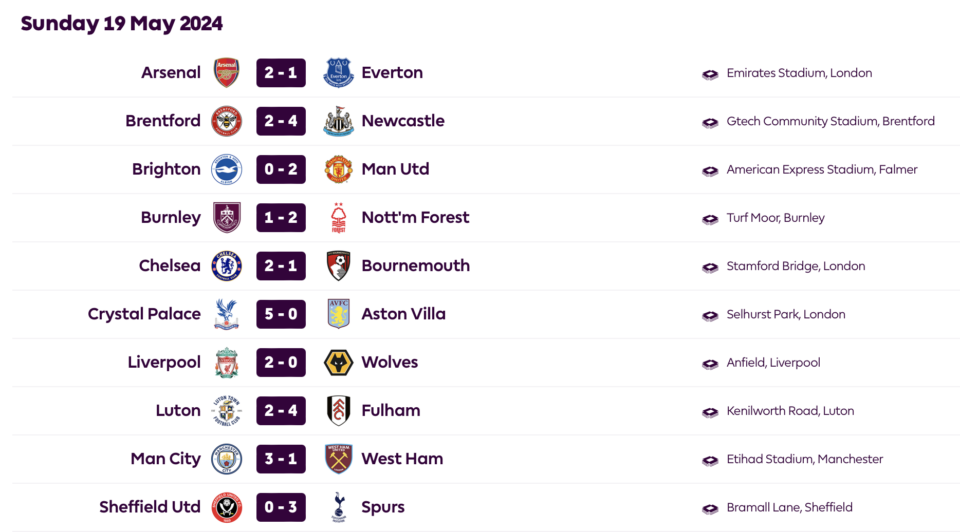Bookmakers Count Their Losses? Premier League Final Matchday Delivers No Surprises
As the curtain falls on the Premier League season, bookmakers are feeling the pinch. The final matchday proved particularly costly for betting operators, as all the favorites triumphed without a single draw in sight.

Betting Patterns and Bookmaker Losses
In sports betting, the general public tends to back the favorites. These are the teams or players perceived as more likely to win due to their superior performance, form, or reputation.
Consequently, bookmakers set lower odds for favorites, reflecting their higher probability of winning and offering lower returns on bets placed on them. Despite this, the sheer volume of bets on favorites can lead to substantial payouts when they prevail.
The Final Matchday: A Perfect Storm
The last day of the Premier League season saw a series of matches where the expected victors emerged unscathed. Arsenal defeated Everton, Newcastle overcame Brentford, Manchester United triumphed over Brighton, and Tottenham cruised past Sheffield United, among others.

Every single favorite won their match, and there were no draws to provide the unexpected outcomes that bookmakers rely on to balance their books.
The pattern was similar in the Bundesliga on Saturday. Although Bayern Munich lost to Hoffenheim, many bettors had anticipated this due to Bayern’s recent poor form.
Union Berlin, Bayer Leverkusen, Borussia Dortmund, and Heidenheim all secured victories as favorites. The lack of surprising results and only one draw (Eintracht Frankfurt vs. RB Leipzig) meant that bookmakers faced significant payouts across both leagues.
Why Predictability Hurts?
Bookmakers thrive on unpredictability. Upsets draws, and underdog victories are their bread and butter because they lead to unclaimed bets, which boost profits.
When favorites win consistently, it results in large payouts to bettors who placed their money on these predictable outcomes. The last round of the Premier League season exemplified this situation perfectly, where the dominance of favorites across the board led to a significant financial hit for betting operators.
How Bookmakers Set Odds?
Bookmakers calculate the true odds of an event based on various factors such as team performance, player statistics, injuries, and other relevant data. They then apply a margin, known as the “vig” or “juice,” to ensure profitability.
For example, if a team has a true probability of winning that suggests even odds (1:1), bookmakers might set the odds slightly lower (e.g., 1.91) to ensure they make a profit regardless of the outcome.
Despite the lower odds, the volume of bets on favorites can be overwhelming. Many bettors prefer placing their money on favorites because it seems like a safer bet. However, this leads to substantial payouts for bookmakers when these favorites win.
For instance, if a majority of bettors place large sums on a favorite team like Manchester City or Bayern Munich, and these teams win as expected, the payouts can significantly exceed the bookmakers’ intake from losing bets.
